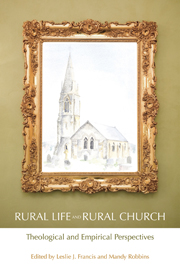Book contents
- Frontmatter
- Contents
- Preface
- Foreword by The Bishop of Shrewsbury, The Rt Revd Mark Rylands
- 1 Introduction: shaping rural theology
- PART 1 PERSPECTIVES FROM THE BIBLE
- PART 2 PERSPECTIVES FROM ORDINARY THEOLOGY
- PART 3 THEOLOGICAL AND SOCIOLOGICAL PERSPECTIVES
- PART 4 HISTORICAL PERSPECTIVES
- PART 5 LISTENING TO VISITORS
- PART 6 LISTENING TO THE COMMUNITY
- PART 7 LISTENING TO CHURCHGOERS
- PART 8 LISTENING TO CHURCH LEADERS
- PART 9 SATISFACTION AND STRESS IN MINISTRY
- Contributors
- Sources
- Subject Index
- Name Index
Foreword by The Bishop of Shrewsbury, The Rt Revd Mark Rylands
- Frontmatter
- Contents
- Preface
- Foreword by The Bishop of Shrewsbury, The Rt Revd Mark Rylands
- 1 Introduction: shaping rural theology
- PART 1 PERSPECTIVES FROM THE BIBLE
- PART 2 PERSPECTIVES FROM ORDINARY THEOLOGY
- PART 3 THEOLOGICAL AND SOCIOLOGICAL PERSPECTIVES
- PART 4 HISTORICAL PERSPECTIVES
- PART 5 LISTENING TO VISITORS
- PART 6 LISTENING TO THE COMMUNITY
- PART 7 LISTENING TO CHURCHGOERS
- PART 8 LISTENING TO CHURCH LEADERS
- PART 9 SATISFACTION AND STRESS IN MINISTRY
- Contributors
- Sources
- Subject Index
- Name Index
Summary
It was a sunny summer morning before breakfast. Wandering in the meadows up on Dartmoor, I saw a Copper, a Blue, a Marbled White, a Comma, a Clouded Yellow and a Fritillary – all in the space of half an hour. The experience took me straight back to my childhood and memories of my father who taught me to spot and catch butterflies. Twenty-nine years a country parson in South Cheshire, I'll never forget the picture of his study as I showed a wedding couple in for marriage preparation. In the far corner, between the window and the bookshelves, were butterfly nets with boxes on the floor full of chloroformed butterflies waiting to be set. A fishing rod leant against the filing cabinet with an open spool reel and trout flies resting on top of the banns of marriage book. Behind an armchair, beer was brewing; and next to the beer was a large planter pot, full of moist dark peaty soil, growing mushrooms. To a boy brought up in a rural rectory, it seemed like an Aladdin's cave – I enjoyed drifting in there when Dad was out visiting.
Rural ministry has, at times, been viewed in the Church of England as a ‘second class’ ministry – a place for those without the courage or ability to cope with the cutting edge of a deprived urban estate or the demands of a large town church. This is, obviously, a warped view from which I was fortunately spared by the example of my father and his ministry.
- Type
- Chapter
- Information
- Rural Life and Rural ChurchTheological and Empirical Perspectives, pp. xi - xiiPublisher: Acumen PublishingPrint publication year: 2012

